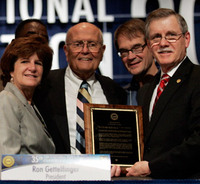Dingell Challenges Hyundai CEO, South Korea to Level Autos Playing Field
SEE ALSO Hyundai Buyers Guide
SEE ALSO America's Problem-American Solution
DEARBORN, MI - October 25, 2010: Congressman John D. Dingell (D-MI15) sent the following letter to Hyundai Motor America President and CEO John Krafcik about comments he made saying the South Korean-based automaker is more American than companies with headquarters in Southeast Michigan.
Mr. John Krafcik
President and CEO
Hyundai Motor America
P.O. Box 20850
Fountain Valley, CA 92728-0850
Dear Mr. Krafcik:
I read with great interest the October 21, 2010, CNNMoney.com story, "Hyundai: We're More American Than Detroit" in which you implied Hyundai is more American than U.S.-based automobile companies. As a member of Congress who represents thousands of American workers in the U.S. automobile industry, I find this implication curious and, quite frankly, misleading.
Ford sold approximately twice as many cars in the United States last year as Hyundai and Kia, yet Ford employed nearly eight times as many Americans as those companies during that time. As you may know, this is due to the fact that Ford manufactured about seven times as many vehicles in the United States than did Hyundai and Kia. In point of fact, in the increasingly competitive automobile industry, where vehicle design, engineering, manufacturing, marketing, and financing take place matters most. Chrysler, Ford, and General Motors support many more American jobs than do their South Korean counterparts because these companies do the substantial portion of the aforementioned tasks in the United States. In contrast, Hyundai does the bulk of such work in South Korea and, I might add, sends the majority of its profits to that country as well. To illustrate, I understand that only one in 20 of Hyundai’s and Kia’s employees works in the United States, whereas one in three works in the United States in the case of Ford.
Consequently, I think it absurd to suggest that Hyundai is more American than U.S.-based automakers. Should you nevertheless wish to continue painting your vehicles as more red, white, and blue than other automobile manufacturers, I respectfully request that you answer the following questions:
1. Hyundai is rightly proud of the improvements in competitive position and vehicle quality it has made in recent years. With this in mind, will you communicate to the government of the Republic of Korea that Hyundai no longer requires protectionism in the form of tariff and non-tariff barriers to trade in order to compete with foreign automakers?
2. Similarly, will Hyundai now support amending the pending U.S.-Korea free trade agreement to allow greater market access for U.S.-built vehicles in South Korea?
3. Given your comments about Hyundai’s being more American than U.S.-based automakers in the CNNMoney.com article referenced above, will Hyundai publicly commit to complying with all applicable parts of U.S. statute, including the Foreign Corrupt Practices Act (FCPA)? With respect to compliance with the FCPA, will Hyundai publicly commit to halting sales or the manufacture of its vehicles in Iran?
Please submit to my office your responses to these questions no later than the close of business, Wednesday, November 10, 2010, prior to the next G-20 meeting in South Korea. I believe they will be invaluable to ascertaining the true extent to which Hyundai may be considered more American than companies such as Chrysler, Ford, and General Motors. Should you have questions about this matter, please feel free to have your staff contact Andrew Woelfling in my office at 202-225-4071.
With every good wish,
Sincerely,
John D. Dingell
Member of Congress
From the Hyundai Web Site
REBORN IN THE USA"Hyundai may be a Korean company, but over half the cars we sell in the U.S. are made in the U.S. We have a technologically sophisticated manufacturing facility in Montgomery, Alabama, engineering facilities in Michigan, plus design, research, and testing grounds in California. All of which provides around 5,000 jobs for American automotive workers.
Add to this more than 20,000 employees at Hyundai dealerships and 6,000 workers employed by our various vendors, and you’ve got quite the micro-economy."



